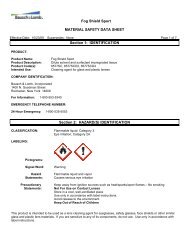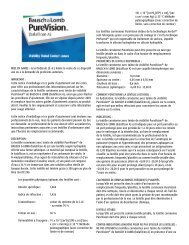Bausch & Lomb Perfecting vision, enhancing life for 150 years A ...
Bausch & Lomb Perfecting vision, enhancing life for 150 years A ...
Bausch & Lomb Perfecting vision, enhancing life for 150 years A ...
Create successful ePaper yourself
Turn your PDF publications into a flip-book with our unique Google optimized e-Paper software.
Think of Others First<br />
Captain Henry C. <strong>Lomb</strong><br />
Henry C. <strong>Lomb</strong> was born November 24, 1828, in Burgham, Germany. When his<br />
father, a prominent lawyer, died in 1837, Henry was sent to live with an uncle and<br />
was soon apprenticed to a cabinetmaker. Like J.J. <strong>Bausch</strong>, Henry sailed <strong>for</strong> New<br />
York City in 1849 as famine and revolution broke out across Germany. He went<br />
to Rochester and worked as a carpenter until he joined J.J. <strong>Bausch</strong> in the optical<br />
business.<br />
The partnership that began the company was founded on Henry <strong>Lomb</strong>’s loan of<br />
sixty dollars to J.J. <strong>Bausch</strong>. For <strong>years</strong> Henry continued working as a carpenter,<br />
living with <strong>Bausch</strong> and his wife to save money and investing in the business.<br />
When Henry left Rochester in 1861 to fight in the Civil War, <strong>Bausch</strong>’s debts to<br />
him had grown to a thousand dollars. Henry had enlisted in the Thirteenth<br />
Regiment of the New York Volunteers, which saw action in more than twenty<br />
important battles including Bull Run, Fairfax Court House, Antietam and<br />
Fredericksburg. By the time Henry was mustered out in May 1863, he had risen<br />
through the ranks from sergeant to captain. Throughout the<br />
war, he sent part of his Army pay to J.J. <strong>Bausch</strong> in Rochester to keep the<br />
business afloat.<br />
After Henry returned to Rochester, J.J. <strong>Bausch</strong> made him a partner in the<br />
business and renamed it the <strong>Bausch</strong> & <strong>Lomb</strong> Optical Company. By 1866, the<br />
company’s rubber-framed spectacles had met with such success that the<br />
partners opened a sales office in New York City, and Henry moved there to run it<br />
until it closed in 1881. Upon his return to Rochester, Henry embarked on a series<br />
of philanthropic works that were to leave a lasting mark on both the company and<br />
the city. Always pre-occupied with the welfare of the employees, Henry started<br />
the factory lunchroom and pioneered the idea of a mutual benefit association to<br />
help those who were unable to work due to illness. He was active in the Grand<br />
Army of the Republic and he began a program, soon adopted all over the<br />
country, to interest public and parochial schoolchildren in planting flowers on the<br />
graves of soldiers on Memorial Day.<br />
In 1885, he founded the Mechanics Institute to train skilled workers and replace<br />
the cumbersome apprenticeship system. A strong believer in the value of<br />
education, he anonymously paid the tuition <strong>for</strong> scores of employees to attend the<br />
school. Henry’s personal donations kept the school operating during its early<br />
<strong>years</strong>; it survives today as the Rochester Institute of Technology. Henry also<br />
introduced kindergartens to the Rochester public school system, started (and<br />
helped to fund) a free dental clinic in the city and founded the Rochester Public<br />
Health Association. His last public appearance, eight days be<strong>for</strong>e his death, was<br />
at a Public Health Association meeting where he was reportedly asked <strong>for</strong> his<br />
advice. His reply, which illustrates his <strong>life</strong>long example of modesty, selflessness






